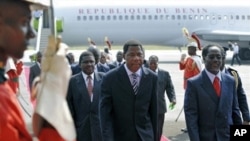Three African heads of state are in Abidjan, on behalf of West African regional bloc ECOWAS, to urge incumbent Ivorian president, Laurent Gbagbo, to step down and bring a peaceful end to a violent, month-long, political power struggle.
It has now been a month since Ivory Coast's November 28 presidential runoff that was meant to mark an end to more than a decade of internal division in the post-conflict country, but has instead led to a tense political showdown that the United Nations says has killed more than 170 people.
The presidents of Benin, Sierra Leone and Cape Verde are set to meet with incumbent president, Laurent Gbagbo, in Abidjan Tuesday to deliver an ECOWAS ultimatum: Gbagbo can step down peacefully or face removal by force.
Gbagbo has agreed to meet with the delegation but shows no signs of caving. A Gbagbo government spokesman told the BBC Tuesday that it would not tolerate meddling by international institutions.
The United Nations and much of the international community say challenger Alassane Ouattara won the presidential election.
Ouattara spokesman, Patrick Achi, told VOA that Gbagbo should be forced to step down as a deterrent to other African rulers who may also want to cling to power.
"Today, I think they [the ECOWAS leaders] are going to give him the last message that this is the last chance for him to be reasonable and to come down to reality and to understand that the only way to peacefully leave office is to go now," said Achi.
Abidjan residents and human rights groups have accused armed groups loyal to Gbagbo of extra-judicial killings, kidnappings and torture since the election. The U.N. has condemned the violence.
Gbagbo's camp has denied allegations of human rights violations and accused the United Nations of losing its objectivity in favor of Ouattara, who is currently based in an Abidjan hotel protected by U.N. peacekeepers and former rebel fighters.
The United Nations says its 10,000-member peacekeeping force will remain in Ivory Coast on an impartial mandate to protect civilians, despite Gbagbo's demands they withdraw.
Original electoral commission results said Ouattara won the poll with 54 percent of votes. The constitutional court, led by a Gbagbo ally, then annulled 10 percent of ballots as fraudulent and proclaimed Gbagbo the winner with 51 percent of votes.
Compromise is looking like an increasingly attractive option to Ivorians who have grown weary of the violent political gridlock.
Student Wilfrid Djedje says the best solution is to sit down and discuss. He says if the country has to have two presidents, let there be a president and a vice president for the people's happiness, adding that his country has had too much bloodshed and the people are tired.
Analysts, however, say a power-sharing government is out of the question for Ivory Coast, and many expect the ECOWAS delegation to offer Gbagbo political asylum if he resigns.
So far, Gbagbo has remained defiant in the face of international sanctions and moves by the World Bank and the West African Central Bank last week to block his access to funds.
ECOWAS has threatened a military intervention if Gbagbo refuses to step down, but some analysts doubt whether West African nations have the operational capability, manpower or political will for such an effort and worry that any attempt at a forceful removal could trigger open conflict.
Gbagbo has warned any attempt to remove him by force could reignite civil war.




